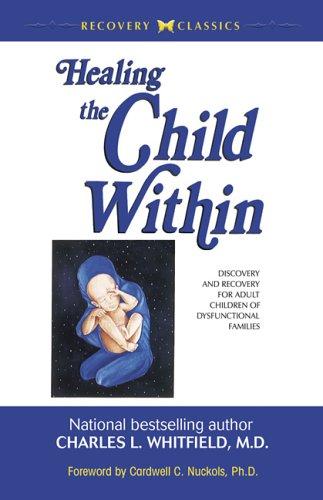Healing the Child Within:
Discovery and Recovery for Adult Children of Dysfunctional Families

Chapter 1
Discovering Our Child Within
Introduction
The concept of the Child Within has been a part of our world culture for at least two thousand years. Carl Jung called it the "Divine Child" and Emmet Fox called it the "Wonder Child." Psychotherapists Alice Miller and Donald Winnicott refer to it as the "true self." Rokelle Lerner and others in the field of chemical dependence call it the "inner child."
The Child Within refers to that part of each of us which is ultimately alive, energetic, creative and fulfilled; it is our Real Self who we truly are.
With our parents' unknowing help and society's assistance, most of us deny our Inner Child. When this Child Within is not nurtured or allowed freedom of expression, a false or co-dependent self emerges. We begin to live our lives from a victim stance, and experience difficulties in resolving emotional traumas. The gradual accumulation of unfinished mental and emotional business can lead to chronic anxiety, fear, confusion, emptiness and unhappiness.
Denial of the Child Within and the subsequent emergence of a co-dependent self are particularly common among children and adults who grew up in troubled families, such as those where chronic physical or mental illness, rigidity, coldness or lack of nurturing were common.
Yet, there is a way out. There is a way to discover and to heal our Child Within and to break free of the bondage and suffering of our co-dependent or false self. That is what this book is about.
Will This Book Help Me?
Not everyone was mistreated or abused as a child. No one really knows how many people grow up with a healthy amount and quality of love, guidance and other nurturing. I estimate perhaps 5 to 20%. This means that from 80 to 95% of people did not receive the love, guidance and other nurturing necessary to form consistently healthy relationships, and to feel good about themselves and about what they do.
While not easy to determine whether you lean toward being more healthy or less healthy in relationships with self and others, you may find it helpful to answer some of the following questions.
I call it the "Recovery Potential Survey" because it reflects not only our woundedness, but also the potential that we have to grow and to realize an alive, adventurous and happy life.
Recovery Potential Survey
Circle or check the word that most applies to how you truly feel.
(1.Never 2.Seldom 3.Occasionally 4.Often 5.Usually)
1) Do you seek approval and affirmation?
2) Do you fail to recognize your accomplishments?
3) Do you fear criticism?
4) Do you overextend yourself?
5) Have you had problems with your own compulsive behavior?
6) Do you have a need for perfection?
7) Are you uneasy when your life is going smoothly? Do you continually anticipate problems?
8) Do you feel more alive in the midst of a crisis?
9) Do you care for others easily, yet find it difficult to care for yourself?
10) Do you isolate yourself from other people?
11) Do you respond with anxiety to authority figures and angry people?
12) Do you feel that individuals and society in general are taking advantage of you?
13) Do you have trouble with intimate relationships?
14) Do you attract and seek people who tend to be compulsive?
15) Do you cling to relationships because you are afraid of being alone?
16) Do you often mistrust your own feelings and the feelings expressed by others?
17) Do you find it difficult to express your emotions?
If you answered "occasionally," "often," or "usually" to any of these questions, you may find it useful to continue reading. (These questions are modified from Al-Anon Family Group, 1984, with permission.)
Other questions to consider are:
18) Do you fear any of the following:
losing control?
your own feelings?
conflict and criticism?
being rejected or abandoned?
being a failure?
19) Is it difficult for you to relax and have fun?
20) Do you find yourself compulsively eating, working, drinking, using drugs, or seeking excitement?
21) Have you tried counseling or psychotherapy, yet still feel that "something" is wrong or missing?
22) Do you frequently feel numb, empty, or sad?
23) Is it hard for you to trust others?
24) Do you have an over-developed sense of responsibility?
25) Do you feel a lack of fulfillment in life, both personally and in your work?
26) Do you have feelings of guilt, inadequacy or low self-esteem?
27) Do you have a tendency toward having chronic fatigue, aches and pains?
